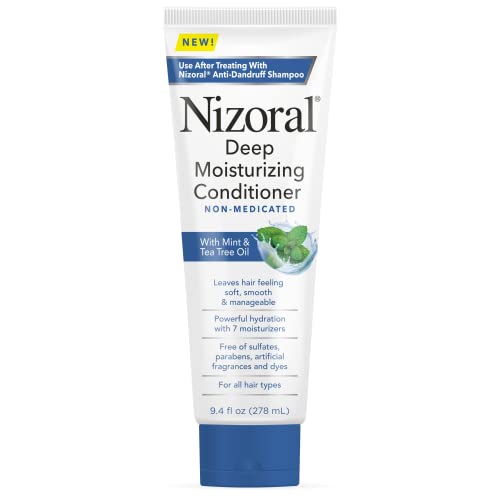Are you confused about antifungal shampoo and which one to buy? Have you tried different brands and found them lacking?
Wanting to try Nizoral but not sure if you should fork out more money for something that might not work?
Nizoral Anti-dandruff Shampoo 1% contains ketoconazole, which is an anti-fungal agent that is well proven to treat scalp seborrheic dermatitis and dandruff. Most people have found it a good and effective treatment and it’s one of the anti-dandruff shampoos that are most recommended by doctors. Of all the anti-dandruff shampoos our there, Nizoral would be one of my first picks.
Come with me as I take a deep dive into Nizoral, how to use it and what side effects to expect:
What is Nizoral?
Nizoral is a company that traditionally used to only make anti-dandruff shampoos containing the active ingredient ketoconazole. You can get Nizoral 1% over-the-counter but you’ll need a doctor’s prescription for the stronger version, Nizoral 2%. In recent years, they have branched out to include Nizoral Psoriasis Shampoo (containing salicylic acid) and Nizoral conditioner which is non-medicated.
How effective is Nizoral shampoo for scalp seborrheic dermatitis?
Many human and lab trials have been done on the effectiveness of ketoconazole for seborrheic dermatitis and dandruff. Nizoral shampoo was even used in some of these studies.
A 1995 study showed that 88% of people with moderate to severe dandruff found ketoconazole 2% shampoo effective when used twice a week for 2-4 weeks. When the shampoo was used only once a week for 6 months after (maintenance phase), only 19% had their dandruff come back.
Another study compared Nizoral 2% to a shampoo containing 1.5% Ciclopirox olamine and 3% salicylic acid and found that both groups showed significant improvement in dandruff shedding.
Sadly for Nizoral 1%, most trials were done on ketoconazole 2% strength shampoo. In fact, a study comparing ketoconazole 1% and ketoconazole 2% shampoo found the stronger shampoo was more effective at controlling dandruff and scalp seborrheic dermatitis.
(I compare the various antifungal options in this article)
Naturally, you would expect Nizoral 2% to be better than Nizoral 1% shampoo. However, it’s worth trying the 1% first since it’s easily available and to get a doctor’s prescription for the 2% if you find the 1% not good enough.
How does Nizoral shampoo work?
Nizoral shampoo contains ketoconazole, which is an antifungal agent. Ketoconazole helps to treat dandruff and seborrhoeic dermatitis by reducing the growth of Malassezia yeast on the scalp. As a results, it relieves symptoms such as flaking, scaling, and itching.
How do you use Nizoral?
Use Nizoral shampoo twice a week. Massage the shampoo into your scalp and hairline. If you wash your hair more often, use a regular shampoo in between. If you use Nizoral too often, you can run into more side effects (read below).
How long does Nizoral take to work?
Based on trial data, you should continue on this regimen for 2-4 weeks to get the upper hand on dandruff. Once your symptoms are more controlled, you’ll only need to use it once a week or once every 2 weeks.
Even if you have color-treated hair, chemically processed or gray hair, you can still use Nizoral. However, expect that your hair will be drier and more brittle with it.
Side effects of Nizoral Shampoo
As with most commercial anti-dandruff shampoos, the most common complaint is dryness. Nizoral can dry out your hair and scalp. That’s why they came out with Nizoral conditioner, complete with 7 moisturizing compounds, to repair your hair.
Other common side effects include thinning hair, changes in the color or texture of your hair, dry skin, and mild itching.
Less common but more serious side effects may occur. This includes burning, stinging or severe irritation, skin redness or pain.
Can I use Nizoral shampoo every day?
You should only use Nizoral shampoo twice a week. Using it every day will increase your chances of getting side effects from Nizoral. It will also dry your scalp and make your hair brittle. It can even have a rebound effect and make your dandruff worse.
Alternatives to Nizoral Shampoo
There are other options available if you don’t like or can’t use Nizoral. Check out my article on The 9 Best Shampoos For Seborrheic Dermatitis. Alternatively, here are some other options:
- Head & Shoulders Shampoo (1% zinc pyrithione – read my take on zinc pyrithione in this article)
Read my Head & Shoulders shampoo review.
- Selsun Blue Shampoo (1% selenium sulfide)
- Neutrogena T/Gel Shampoo (coal tar- my take here)
Check out Is Neutrogena T/gel good for seborrheic dermatitis?
- Neutrogena T/Sal Shampoo (salicylic acid – read Is salicylic acid good for seborrheic dermatitis?)
- Thursday Plantation Shampoo (tea tree oil)
None of these (including Nizoral) are ‘perfect’. They work for some but not for others. Plus, they all make your hair and scalp dry.
I’m currently using a few drops of tea tree oil with my regular shampoo and have found it works well, makes my hair smell great and doesn’t leave me with dry, brittle hair.
You can also try henna hair dye. Henna has antifungal activity against Malassezia and may be a good natural treatment.
I’ve compiled all your treatment options for seb derm in The Ultimate Guide to Seborrheic Dermatitis Treatment. Check it out.
 Check it out on Amazon
Check it out on Amazon Check it out on Amazon
Check it out on Amazon Check it out on Amazon
Check it out on Amazon Check it out on Amazon
Check it out on Amazon Check it out on Amazon
Check it out on Amazon Check it out on Amazon
Check it out on Amazon Check it out on Amazon
Check it out on Amazon
Pingback: Is ketoconazole an effective treatment for seborrheic dermatitis?
Pingback: The Ultimate Guide to Seborrheic Dermatitis Treatment
Pingback: What is the best antifungal cream for seborrheic dermatitis?
Pingback: seborrheic dermatitis hairline